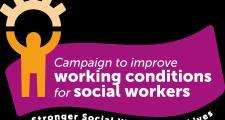

The British Association of Social Workers (BASW) and the Social Workers Union (SWU) announced the launch of a wide-reaching campaign to improve professional working conditions for social workers across the UK, at BASW’s annual conference in Manchester (June 2025).
Former BASW Chief Executive Ruth Allen said: “Social workers provide vital services to adults and children at risk of harm and disadvantage, yet both the profession and people they serve are being failed by a system that does not provide adequate resources, staffing, or support. This campaign represents our commitment to ensuring social workers have the conditions they need to protect and support those who depend on their expertise."
The campaign focus
- Adequate and safe staffing
- Sustainable workloads
- Proper funding and investment in social work services
- Better services through better professional development
- Recognition and respect for social work expertise
- Improved mental health and wellbeing support for practitioners
John McGowan, General Secretary of SWU said: "The statistics speak for themselves – we are facing a crisis that threatens not just the wellbeing of social workers, but the safety and support of the children, families, and adults who rely on social work services. Urgent action is needed to address staffing levels, workload management, and professional support."
The campaign comes in response to years of research by BASW, SWU and others showing deteriorating conditions for social workers. New research by SWU with ITV News published in 2025 of 2,380 social workers shows that 86% of social workers believe the profession has inadequate staffing levels, with 84% saying these shortages are seriously limiting their ability to do their jobs properly.
Wellbeing Toolkit Launched
As part of the campaign, a new wellbeing toolkit has been launched by BASW and SWU to help drive systemic change involving all stakeholders – from frontline social workers to senior leaders.
A preview summary is now available below- follow us for updates of the full toolkit launch!
Toolkit
Chapter 1: Introduction
Includes sections on:
- Background
- The 12 Changes
- A holistic, systemic and integrated approach
- What does the toolkit aim to do?
- Who is this toolkit for?
- Using the toolkit
- BASW Code of Ethics
Chapter 2: Evidence summary
Includes sections on:
- A summary of evidence: the case for change
- Understanding stress
- The reasons for stress and poor morale in social work
- Retention
- Tackling racism and all forms of discrimination
- Comparisons with other occupations: the HSE Management Standards
Chapter 3: The Integrated Approach
Includes sections on:
- An Integrated Approach
- The Integrated Approach to Change (2025)
- Accounting for the structural context of social work
- A highly unequal society
- Resourcing the workforce
Chapter 4: Self care, rights and wellbeing
Includes sections on:
- Looking after yourself at work
- Understanding our own wellbeing
- Understanding employers responsibilities for workplace health and wellbeing
- Knowing your rights at work
- Actions: exercising your rights at work
- Tackling Bullying, Harassment and Discrimination
- You are not alone
- Self-care
- Self-care outside of work
- Being honest with ourselves
- Moral and ethical stressors
- Guidance on working with people in poverty
- When personal challenges affect wellbeing at work
- Personal agency and choice: is this the right place for me now?
- Resilience
Chapter 5: CPD and Career development
Includes sections on:
- Continuing Professional Development (CPD) and career development
- The value of CPD to wellbeing
- Making time for learning
- Asking for time for CPD
- Diversifying forms of learning
- Managing Artificial Intelligence and Digital Learning
- Enabling social worker engagement in research and academic work
- CPD for all career stages
- A Learning Culture
Chapter 6: Practice Supervision and Practice Leadership
Includes sections on:
- Practice supervision
- Supervision as a joint responsibility
- A framework for reflective supervision
- Becoming a practice supervisor
- Practice leadership
- A learning culture vs blame culture
Chapter 7: Mentoring and Coaching
Includes sections on:
- The value of mentoring and coaching in social work
- Mentoring
- The Professional Capabilities Framework (PCF) for England
- Coaching
- The BASW Social Work Professional Support Service (SWPSS)
The summaries for ‘Tools for Teams’ and ‘Tools for Organisational Managers and Leaders’ and full bibliography and references are forthcoming in July, along with the PDF of the full toolkit
Campaign background
New research by SWU with ITV News published in 2025 of 2,380 social workers shows that 86% of social workers believe the profession has inadequate staffing levels, with 84% saying these shortages are seriously limiting their ability to do their jobs properly.
- Most alarmingly, 80% of social workers report that understaffing is putting the people they work with at risk, while 90% say that lack of funding and investment is impacting their ability to do their job effectively.
- The cost to staff is severe, with 76% of social workers reporting their mental health is in crisis and just over a quarter (27%) find themselves emotionally exhausted at least once a week.
- The research reveals that around half of those surveyed are considering leaving social work entirely, representing a potential exodus of experienced professionals at a time when their services are most needed.
This latest research builds on a concerning pattern identified in previous studies demonstrating there has been little improvement in working conditions over a 7 year period. Joint research by BASW and SWU with Bath Spa University in 2018 found that 60% of social workers were looking to leave their current job within 15 months, with nearly 40% planning to leave the profession entirely.
BASW's 2023 annual survey found that 46.91% of respondents identified inadequate staffing levels as one of their workplace's biggest challenges, while 50.21% reported being unable to manage their current workload.
Comparative analysis shows that working conditions for social workers are worse than 90-95% of other employees in both public and private sector occupations. Social workers are working an average of 64 days per year more than contracted – equivalent to 11 additional hours per week – with high caseloads and administrative burdens creating unsustainable pressure.
Access support and resources
Click below to view our previous campaign work
Good Practice Toolkit (2020)
In 2020, BASW and SWU launched the Social Worker Wellbeing and Working Conditions Good Practice Toolkit.
This toolkit is aimed at accelerating action across all parts of the workplace. It is for social workers in practice, social work supervisors, workforce development leads, managers, and leaders.
Survey Findings
UK Social Workers: Working Conditions and Wellbeing (2017)
- Over 1200 social workers participated and overwhelmingly named the same triggers for burn out: unmanageable caseloads, lack of resources and little professional support.
- For most job roles working conditions are at a completely unacceptable level. Workload, including too many cases or too high a complexity, and paperwork/administrative duties were the two biggest issues.
- A standout finding was that 52% of UK social workers intend to leave the profession within 18 months due to burn out, increasing to 55% for social workers working specifically in children’s services.
UK Social Workers: Working Conditions and Wellbeing (2018)
- Compared to the UK average, working conditions were worse than 90%-95% of other employees in both public and private sector occupations. Main problems were high case and administrative loads, and lack of resources.
- Nearly half of all social workers are also dissatisfied in their jobs and two thirds have attended work while ill at least twice in the previous year
- Social workers worked an average of 64 days per year more than they are contracted to.
- 60% looking to leave their current job within 15 months with nearly 40% looking to leave the profession entirely.
- 71.87% of respondents felt unable to complete their work within their contracted hours, with almost one quarter reporting working an additional 10 hours or more per work. The vast majority were unpaid.
- More than one-third reported that the numbers of people with whom they worked had increased during the pandemic and had not yet returned to pre-pandemic levels.
- The biggest challenges facing the profession were considered to be: the failure to adequately fund social care and cuts to local services.
- Recruitment and retention is considered to be one of the biggest challenges facing the profession.
- 74.91% of respondents reported feeling unable to complete their work during their contracted hours
- More social workers feel unable to manage their workload (52.19%), those who do work additional hours go unpaid (90.27%).
- 49.56% have been verbally abused whilst working and 24.03% threatened with physical violence.
- 79.08% report that the cost-of living crisis causes more problems for people using social work services.
Lobbying & Influencing
BASW & SWU proactively lobby politicians from all parties to back our campaign for better working conditions for social workers and are calling on the UK Government to deliver urgent reforms. View some of our activity below.
- BASW/SWU held a Parliamentary reception on 27th November 2018 to engage parliamentarians with our working conditions and wellbeing campaign.
- It was an opportunity to inform them of our survey findings and urge them to work with us to deliver our campaign asks, ensuring the social work profession across the UK is better supported, respected, resourced and valued.
- Over 20 MPs from across the political divide pledged their support to improving working conditions for social workers.In December 2019 we launched the BASW UK manifesto which calls for action to support social workers. This includes a call to tackle poor working conditions and unfeasibly high workloads of social workers.
- Following the General Election, we wrote to all new government ministers and MPs urging them to support the BASW UK social work manifesto and to meet with them to discuss the campaign.
- In March 2022, BASW worked with Cat Smith MP to secure a debate in Westminster on the impact of the pandemic on social work and calling for much improved working conditions. Watch the full debate here.
Media Coverage
BASW & SWU work hard to raise awareness of the impact of poor working conditions on social worker's wellbeing and amplify the case for long overdue and desperately needed improvements through our reach in the national media. Read highlights of our coverage below.
- BASW chair, Gerry Nosowska, speaks to Radio Cornwall about social workers working conditions.
- BASW England professional officer, Becky Reynolds, appears on Victoria Derbyshire
- SWU general secretary, John McGowan, promotes BASW/SWU’s Working Conditions campaign on the radio
- BASW England committee member Lewis Roberts tells of increasing pressure on social workers
- BASW chair Gerry Nosowska looks at deteriorating working conditions and an increase in caseload as drivers behind staff shortages
- BASW and SWU reveal levels of violence and abuse social workers can be exposed to, while calling for protection parity with our emergency colleagues
- BASW CEO Ruth Allen joins BBC Radio 4’s Woman’s Hour to discuss the findings from our survey of over 1400 social workers.
- BASW and SWU comment on how COVID-19 is exacerbating the already-high pressures on workforce
- SWU member Carys Phillips joins TalkRadio to highlight the pressures on UK social workers and how they have been exacerbated by Covid-19 and the pandemic
- BASW CEO Ruth Allen speaks to The Guardian about caseloads, the impact of Covid-19 and urges practitioners to be given more self-autonomy
- BASW England’s Maris Stratulis highlights BASW’s Professional Support Service as a tool to help the sector
- Lewis Roberts speaks to BBC News about the challenges that social workers are facing in managing dealing a rise in demand in fostering during the pandemic
- BASW PO Gavin Moorghen and SWU’s John McGowan warn about the consequences of a “burnt out” workforce
- BASW member Andy Tutte guest joins BBC Radio Merseyside to explain how the pandemic, following years of austerity, has impacted social work by increasing caseloads
- BASW’s NI national director Carolyn Ewart calls for the UK government to fund improved working conditions to improve retention
- BASW PO Denise Monks highlights that experienced social workers leaving an under-resourced sector which is facing increasing demand.
- BASW Chair Gerry Nosowska appeared on Channel 4 News and Sky News to highlight the unworkable pressures on social workers and depletion of resources
- BASW raises awareness of abuse of social workers and condemns this unacceptable behaviour
- BASW’s Anthony Dhadwal warns we aren’t doing enough to retain experienced professionals, while new social workers aren’t being supported enough at the beginning of their careers.
- On Channel 4 News BASW’s first annual survey warns of an overstretched workforce dealing with a pandemic driven rise in caseload and deterioration in working conditions
- Coverage of BASW’s survey focuses on staff shortages, high vacancy rates and our call to Government to launch a nationwide recruitment campaign
- SWU’s John McGowan reveals the increased pressures facing social workers from rising poverty levels and calls for union action
- SWU’s John McGowan calls for better protection and working conditions for social workers and says they need to be “feel valued”
- BASW Chair of England Committee, Vava Tampa, is interviewed on BBC Breakfast to highlight the serious and soaring demands on social work services as a result of the cost-of-living crisis.
- BASW member *Andy and BASW England PO Liz Howard join Steph McGovern on her Packed Lunch Channel 4 show to talk about the mental impact on social workers from increased caseloads and complex cases
- “Social work is often the forgotten sector”, argues BASW, while highlighting poor working conditions, stagnant wages and poor levels of support for both experienced and new social workers.
- SWU's John McGowan appears on BBC Radio 5 Live to highlight poor working conditions and a lack of resources that are holding the profession back
- BASW England chair Vava Tampa on Channel 4 News lays out exactly what is needed to help children’s social workers manage poor working conditions and how to lower caseloads
- SASW Chair Jude Esther appears on Channel 5 to defend social work and provide context on increasing pressures from rising complex caseloads and retention of workforce issues
- An interview with BASW CEO Ruth Allen in The Guardian references stats on showing recruitment and retention challenges from our latest survey


